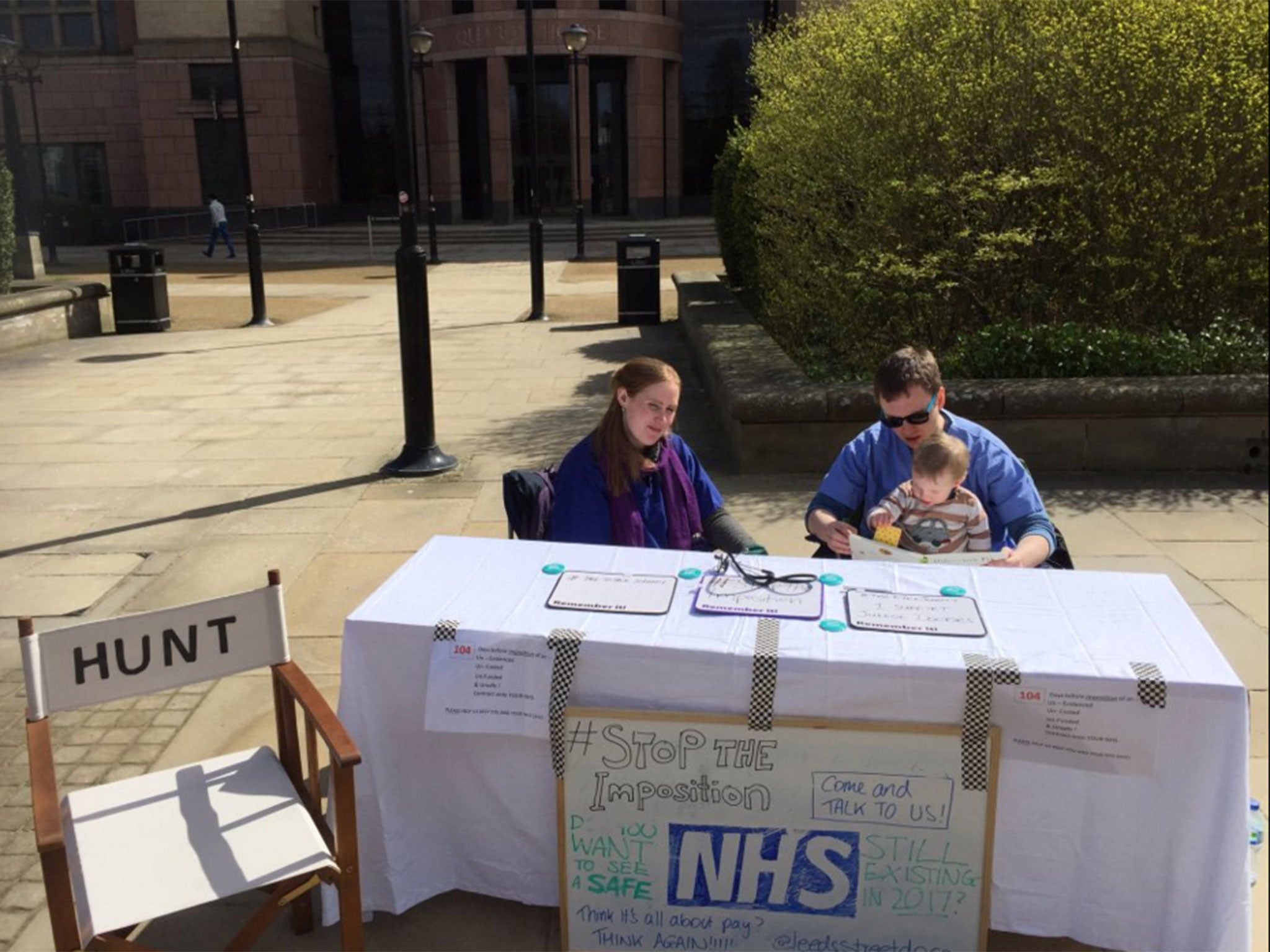Junior doctors begin indefinite protest in Leeds in call for Jeremy Hunt to negotiate new contracts
'If they said they were going to fully fund and staff a seven-day NHS, the junior doctors would jump at it'

Your support helps us to tell the story
From reproductive rights to climate change to Big Tech, The Independent is on the ground when the story is developing. Whether it's investigating the financials of Elon Musk's pro-Trump PAC or producing our latest documentary, 'The A Word', which shines a light on the American women fighting for reproductive rights, we know how important it is to parse out the facts from the messaging.
At such a critical moment in US history, we need reporters on the ground. Your donation allows us to keep sending journalists to speak to both sides of the story.
The Independent is trusted by Americans across the entire political spectrum. And unlike many other quality news outlets, we choose not to lock Americans out of our reporting and analysis with paywalls. We believe quality journalism should be available to everyone, paid for by those who can afford it.
Your support makes all the difference.Junior doctors in Leeds have begun an indefinite rolling protest outside the town’s Department of Health offices calling for the Government to re-enter negotiations over new contracts.
Inspired by two other doctors who began their own 'permanent' demonstration outside London's DoH headquarters, two local medics will take turns on their days off to be seated outside Leeds’ Quarry House.
They say they want to renew “meaningful” engagement with the Department, led by Health Secretary Jeremy Hunt, ahead of the planned all-out junior doctor’s strike on 26 and 27 April.
The British Medical Association (BMA) had said junior doctors were willing to cancel the total strike if Mr Hunt re-entered negotiations which focused on the points the BMA wished to address.
“We’re not deliberately difficult people, we desperately want a contract that’s safe for patients,” said ophthalmology registrar Dr Polly Dickerson, who launched the Leeds protest along with Dr Chris Marshall, to The Independent.
“But Jeremy Hunt doesn’t seem to want to talk to us. We’re here to send a message that, wherever he goes, we are willing to talk.”
The DoH subsequently issued a statement rejecting the offer to hold new talks.
Junior doctors fear the new contract imposed by the government will result in staff being extremely overstretched in hospitals, puttin patients at risk.
“The reason we’re scared and so upset about this contract and worried about being spread thinly is because the seven day service is not just a junior doctor issue, we are a small cog in a massive machine,” said Dr Dickerson.
“We will need the same number of support staff to be there at weekends as we do during the week: more nurses, radiographers, porters, clerks, secretaries, out of hospital staff.
“We routinely work over our hours. The system is already run on goodwill. You wouldn’t have to take too many people away for it to fall over and we are really frightened that’s going to happen.”
Dr Dickerson claimed junior doctors were happy to work weekends, but with proper support and investment.
“If they said they were going to fully fund and staff a seven-day NHS, the junior doctors would jump at it," she said.
“There’s been all this rhetoric from the government about how this is about spoilt junior doctors not wanting to work on Saturday, but we already do. It’s not about that.
“We’re not worried about Saturday pay per se, we’re saying spreading junior doctors thinner isn’t along going to give you a safe seven day service but might reflect current Monday to Friday provision and that’s not safe.”
The prospect of contract imposition has left Dr Dickerson so troubled that she, along with many others, said she was reconsidering her future in the NHS.
“I’ve got to the point where I’m so exhausted and demoralised by the whole thing that I don’t know if I want to carry on and I’m two years away from being a consultant,” she said.
“I’ve got 30 years of operating service to give to the NHS and I’ve always wanted to do that. But I’m wondering if it’s going to be sustainable in its current form.
“It makes you doubt everything you’ve ever worked for and ever believed in.”
The Government decided to resort to contract imposition in February, after Jeremy Hunt’s chief negotiator, NHS hospital chief executive Sir David Dalton, said there was “no realistic prospect of a negotiated outcome”.
Join our commenting forum
Join thought-provoking conversations, follow other Independent readers and see their replies
Comments